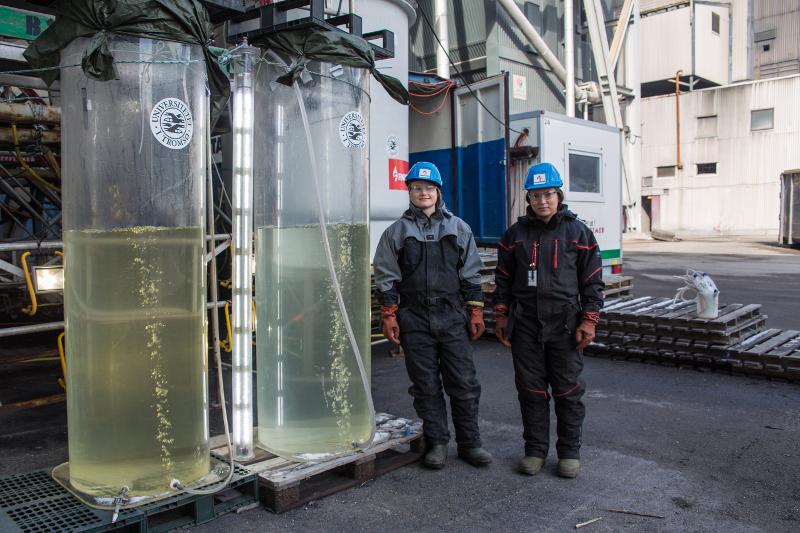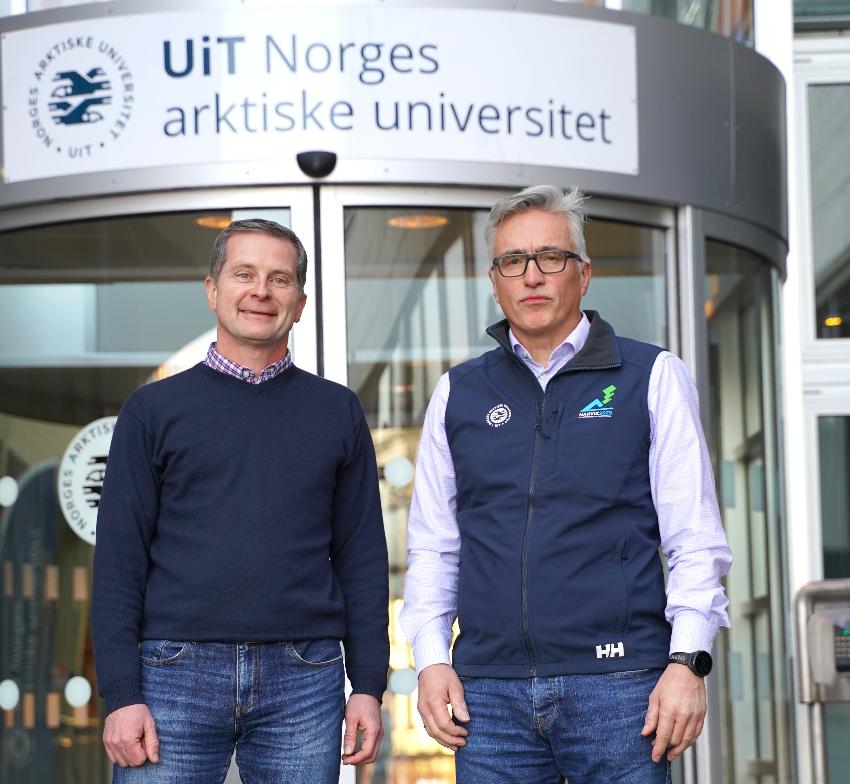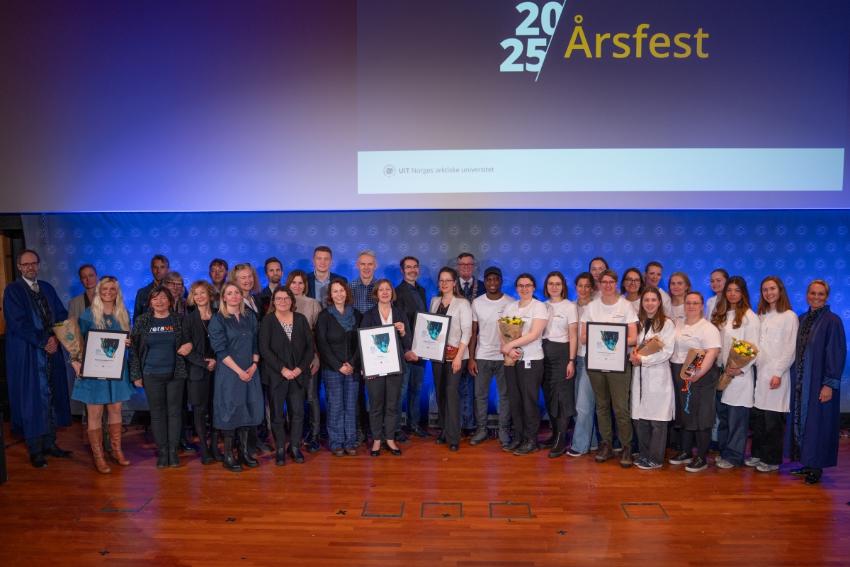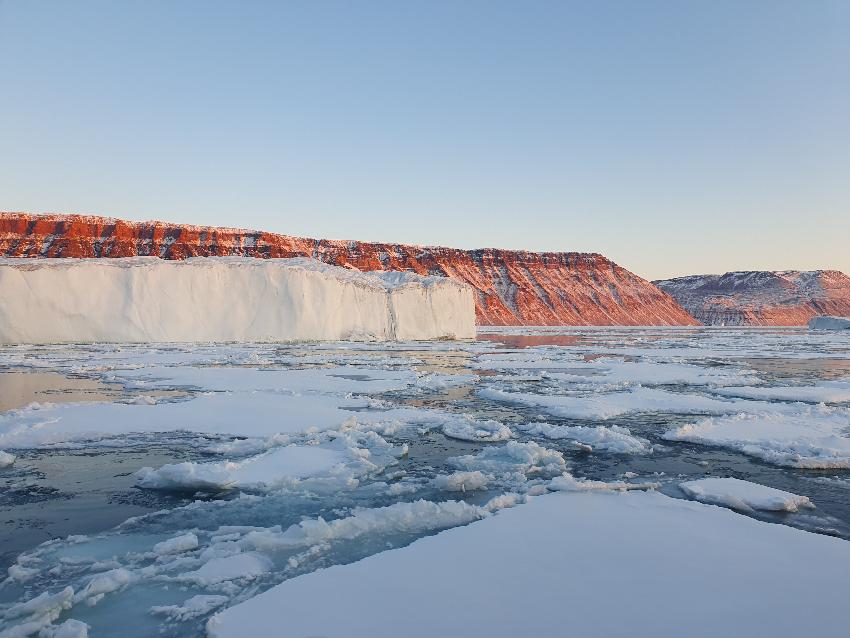Arctic Frontiers 2019: List of Experts
For the media: UiT The Arctic University of Norway offers a rich list of experts at Arctic Frontiers 2019 ”Smart Arctic”.

You can read all about Arctic Frontiers 2019 here. This year´s theme is "Smart Arctic", and you may find experts form UiT within the sub themes:
THE FUTURE OF GOVERNANCE AND HANDLING VULNERABILITY IN ARCTIC ECOSYSTEMS
- Remote sensing and oil spill
- Arctic gas hydrate, environment and climate
- Physical Activity and Health in the Arctic
A SMART ARCTIC FUTURE
Niklas Labba. Academic Director at the Centre for Sami Studies (SESAM)
Research: Reindeer husbandry, indigenous economy, traditional Sami knowledge, climate change and reindeer herding. Niklas Labba participates at Arctic Frontiers on Thursday January 24th with his abstract "Integrating new technologies in reindeer herding and indigenous communities".
Office: +47 77 64 45 66
Mobile: +47 911 67 138
E-mail: niklas.labba@uit.no
Jennifer Clare Heyward. Professor at the Department of Philosophy
Research: The relationship between climate justice and the development and use of new technologies, in particular Solar Radiation Management (SRM) and other forms of geoengineering
E-mail: Jennifer.c.heyward@uit.no
Fern Wickson. Researcher at the North Atlantic Marine Mammal Commission (NAMMCO)
Research: Environmental governance with a special focus on new and emerging technologies – such as biotechnology and nanotechnology
E-mail: fern@nammco.no and fern.wickson@uit.no
Svein Anders Noer Lie. Associate Professor at the Department of Philosophy
Research: The extensive field of environmental philosophy – and with a special interest in – the relationship between nature, human and technology
Office: +47 77 64 56 91
E-mail: svein.a.lie@uit.no
Gunnar Ellingsen. Professor at the Department of Clinical Medicine and leader of Telemedicine and E-health Research Group
Research: Electronic patient record, integration, standardization and ICT-based collaboration, telemedicine. Read more.
Office: +47 77 64 47 72
E-mail: gunnar.ellingsen@uit.no
Audun Hetland. Assistant professor at CARE (Center for Avalanche Research and Education) and leader of the research group Human Factors in High Risk Environment
Research: Decision-making, emotions and motivation, experienced security, extreme sports, outdoor life and adventure tourism. Read more.
Office: +47 77 64 63 68
Mobile: +47 930 41 612
E-mail: audun.hetland@uit.no
Nina Prebensen. Professor at the School of Business and Economics UiT
Research: Service Innovation and Tourist Experiences in the High North: The Co-creation of Value for Consumers, Firms and the Tourism Industry
Office: +47 77 64 67 66
E-mail: nina.prebensen@uit.no
Giovanna Bertella. Associate Professor at the School of Business and Economics UiT
Research: Small-scale tourism, food tourism, rural tourism, nature-based tourism, animals in tourism, active tourism, sustainable tourism
Office: +47 77 64 69 27
E-mail: giovanna.bertella@uit.no
THE FUTURE OF GOVERNANCE AND HANDLING VULNERABILITY IN ARCTIC ECOSYSTEMS
Johannes Brinkmann. Professor at the School of Business and Economics UiT
Research: Business ethics, CSR, consumer ethics, risk and responsibility
Office: +47 77623299
Mobile: +47 464 10 457
E-mail: johannes.brinkmann@uit.no
Rasmus Gjedssø Bertelsen. Professor at the Department of Social Sciences, Barents Chair in Politics
Research: Arctic Governance, War and Peace Dynamics
Mobile: +47 913 18 623
E-mail: rasmus.bertelsen@uit.no
Gunnar Sander. PhD Candidate at the Norwegian College of Fishery Science
Research: Gunnar Sander works with ocean planning and has an interest in ecosystem-based ocean management, on which he has done fieldwork in Canada and Norway. He has also worked with new industries in the Arctic, particularly shipping.
Office: +47 77 64 43 32
Mobile: +47 95 21 87 86
E-mail: gunnar.sander@uit.no
Njord Wegge. Senior Research Fellow NUPI, and Adjunct Associate Professor UiT
Research: Arctic security, military defence and geopolitics + natural resource management
Mobile: +47 905 62 578
E-mail: njord.wegge@uit.no
Gørill Nilsen. Professor at the Department of Archaeology, History, Religious Studies and Theology
Research: Archaeology in the Arctic, and smart Arctic use of the ocean in the period from year 0 to year 1000 AD.
Office: +47 77 64 43 17
Mobile: +47 970 24 434
E-mail: gorill.nilsen@uit.no
Hans Peter Blankholm. Professor at the Department of Archaeology, History, Religious Studies and Theology
Research: Leads the “Joint Proxies” research group on human and natural adaptation to changing climates and environments in the High North (encompasses the Arctic and Subarctic parts of Scandinavia, Greenland, USA, Canada and Russia). A Joint Proxy is an archaeological site with good preservation conditions that contains proxy data of relevance for archaeological, geological, botanical, zoological and climate change research and interpretation. The research network aims to deliver an important and substantial interdisciplinary and international contribution to regional and global knowledge on how both human and natural populations (animals and plants) have adapted to global climate change in the High North through time.
Read more: http://site.uit.no/jointproxies/
Office: +47 77 64 43 65
Mobile: +47 932 32 081
E-mail: hans.peter.blankholm@uit.no
ARCTIC PRODUCTIVITY AND CLIMATE EFFECTS:
Paul Wassmann. Professor at the Department of Arctic and Marine Biology
Research: Arctic marine system ecology, flux of carbon in marine ecosystems as a function of trophic state and climate change, physical-biological coupled 3-D models of pelagic primary production
Office: +47 77 64 44 59
Mobile: +47 977 73 451
E-mail: paul.wassmann@uit.no
Rolf Gradinger. Professor at the Department of Arctic and Marine Biology
Research: Arctic marine system ecology, ecology of Arctic sea ice an phytoplankton, Primary productions, effects of climate change on Arctic marine ecosystems
Office: +47 77 64 45 14
E-mail: rolf.gradinger@uit.no
Bodil Bluhm. Professor at the Department of Arctic and Marine Biology
Research: Arctic marine system ecology, biodiversity, food webs, benthic-pelagic coupling
Office: +47 77 64 43 82
Mobile: +47 940 54 162
E-mail: bodil.bluhm@uit.no
Jørgen Berge. Professor at the Department of Arctic and Marine Biology
Research: Arctic marine ecology, seasonal studies with emphasis on polar night, effects of climate change on Arctic marine ecosystems, sea ice ecology, new introduced species, life history adaptations and ecology of Arctic organisms
Mobile: +47 901 69 125
E-mail: Jorgen.berge@uit.no
Marit Reigstad. Professor at the Department of Arctic and Marine Biology
Research: Arctic marine system ecology, seasonal ice zone and processes taking place under the sea ice, effects of climate change on Arctic marine ecosystems and productivity, coupling between pelagic and benthic systems, challenges for society with opening of new areas caused by climate change
Office: +47 77 64 45 25
Mobile: +47 901 10 092
E-mail: marit.reigstad@uit.no
Hans-Christian Eilertsen. Professor at the Department of Arctic and Marine Biology
Research: Bioprospecting all types marine arctic organisms, physiology/biochemistry of arctic phytoplankton, and irradiance (atmosphere vs. sea) in Arctic environments
Office: +47 77 64 45 40
Mobile: +47 975 22 793
E-mail: hans.c.eilertsen@uit.no
Michaela Aschan. Professor at the Norwegian College of Fishery Science
Research: Bio-economic aspects of fisheries regulation and management; and climate induced changes in the marine ecosystem, stock assessment and population biology
Office: +47 77 64 69 53
Mobile: +47 992 61 458
E-mail: michaela.aschan@uit.no
Nigel Yoccoz. Professor at the Department of Arctic and Marine Biology
Research: Arctic productivity and climate, med research keys : Arctic monitoring, ecological predictions, biodiversity, ecosystem shifts
Office: +47 77 64 68 84
E-mail: nigel.yoccoz@uit.no
Klara Stensvåg. Professor at the Norwegian College of Fishery Science
Research: Marine biotechnology, bioprospecting and antimicrobial molecules from marine organisms
Office: +47 77 64 45 12
Mobile: +47 412 39 918
E-mail: klara.stensvag@uit.no
Jacques Godfroid. Professor at the Department of Arctic and Marine Biology
Research: Emerging infectious diseases in Arctic wildlife
Office: +47 776 25214
Mob: +47 938 65 283
E-mail: Jacques.godfroid@uit.no
Tore Henriksen. Professor at K.G. Jebsen Centre for the Law of the Sea, Faculty of Law
Research: Sea, fisheries, Arctic shipping
Office: +47 77 64 52 37
E-mail: tore.henriksen@uit.no
Vito De Lucia. Researcher at K.G. Jebsen Centre for the Law of the Sea, Faculty of Law
Research: International Law and Law of the Sea (in relation to Environment, Biodiversity, Arctic Governance, Areas beyond National Jurisdiction)
Office: +47 77 62 08 63
E-mail: vito.delucia@uit.no
Ingvild Ulrikke Jakobsen. Associate Professor at K.G. Jebsen Centre for the Law of the Sea, Faculty of Law
Research: Climate, Arctic shipping, environment, integrated oceans management
Office: +47 77 64 62 08
E-mail: ingvild.jakobsen@uit.no
Margherita Poto. Post doc. at K.G. Jebsen Centre for the Law of the Sea, Faculty of Law
Research: Governance in the Arctic, Arctic Council
Office: +47 77 62 31 45
E-mail: margherita.p.poto@uit.no
Kristine Dalaker Kraabel. PhD fellow at K.G. Jebsen Centre for the Law of the Sea, Faculty of Law
Research: Law of the Sea, marine biodiversity, ocean governance
Office: 77645766
E-mail: kristine.d.kraabel@uit.no
Jon Mattias Årén. Professor at the Faculty of Law
Research: Sami- and indigenous people´s law
Office: +47 77 64 69 15
E-mail: jon.m.ahren@uit.no
STATE OF THE ARCTIC
Nicholas Tyler. Researcher at Centre for Sami Studies (SESAM)
Research: Reindeer ecology, reindeer husbandry, reindeer and their ecophysiological adaptation to Arctic environment, reindeer and conflicts with infrastructure development
Office: +47 77 64 47 88
Mobile: +47 905 77 298
E-mail: nicholas.tyler@uit.no
Rossella Ragazzi. Associate Professor at the Arctic University Museum of Norway
Research: Indigenous people's museum and media representation in Norway
Mobile: +47 909 25 278
E-mail: rossella.ragazzi@uit.no
Arve Elvebakk. Professor at the Arctic University Museum of Norway
Research: Arctic bioclimatology and botany
Office: +47 77 62 07 82
Mobile: +47 977 99 088
E-mail: arve.elvebakk@uit.no
Øyvind Stokke. Associate Professor at the Department of Philosophy
Research: Environmental philosophy. Environmental, ethical and business related aspects of optimising industrially relevant technologies for chemical and biological CO2 capture and usage (CCU). Globalizing minority rights.
Office: +47 77 64 63 34
E-mail: oyvind.stokke@uit.no
Trine Antonsen. Associate Professor at the Department of Philosophy
Research: Environmental philosophy with a particular focus on how our material and technological environment affect – and at the same time are conveyed through – our practices and moral virtues
Office: +47 77 64 59 07
E-mail: trine.antonsen@uit.no
Camilla Brekke. Professor at the Department of Physics and Technology
Research: Earth surveillance, Remote sensing of sea-ice and oil-spill
Office: +47 77 64 62 97
Mobile: +47 915 88 660
E-mail: camilla.brekke@uit.no
Anthony Doulgeris. Associate Professor at the Department of Physics and Technology
Research: Remote sensing of sea-ice
Office: +47 77 64 51 77
Mobile: +47 959 25 313
E-mail: anthony.p.doulgeris@uit.no
Are Kristoffer Sydnes. Professor at the Department of Engineering and Safety
Research: Security/protection related to oil spill in the Barents Sea
Office: +47 77 66 03 28
Mobile: +47 975 329 74
E-mail: are.sydnes@uit.no
Torbjørn Eltoft. Professor at the Department of Physics and Technology
Research: Remote sensing of sea ice, chairs the new SFI: CIRFA – Centre for
Integrated Remote Sensing and Forecasting for Arctic Operations
Office: +47 77 64 51 84
Mobile: +47 950 07 345
E-mail: torbjorn.eltoft@uit.no
CENTRE FOR ARCTIC GAS HYDRATE; ENVIRONMENT AND CLIMATE (CAGE). NORWEGIAN CENTRE OF EXCELLENCE:
Karin Andreassen. Professor, director CAGE
Research: Massive craters on the ocean floor in the Arctic caused by abrupt methane release. How past glaciations influence present day changes in the environment. Read more here.
Office: +47 77 64 44 20
Mobile: +47 469 29 027
E-mail: karin.andreassen@uit.no
Benedicte Ferré. Researcher CAGE
Research: Pioneering new technology for measuring methane emissions from the ocean to atmosphere. Environmental observations in harsh Arctic conditions. Collaborations with industry. Read more here.
Office: +47 77 64 66 07
E-mail: benedicte.ferre@uit.no
Alun L. Hubbard, professor CAGE
Research: What is going on with the Greenland ice sheet? Read more here.
Office: +47 77 62 32 53
E-mail: alun.l.hubbard@uit.no
Mohamed Ezat, researcher CAGE
Research: Carbon cycle, CO2 uptake in the Arctic and Atlantic Oceans. Ocean acidification and methane release. Read more here.
Office: +47 77 64 92 46
E-mail: mohamed.ezat@uit.no
Jochen Knies, researcher CAGE/Geological Survey of Norway
Research: Arctic Sea ice as we know it, was established 2,6 million years ago. However, we may see an ice-free Arctic in our lifetime. Which could even affect Indian monsoon. Read more here.
Office: +47 77 62 52 23
E-mail: jochen.knies@uit.no
Mette Marianne Svenning. Professor at CAGE/ Faculty of Biology, Fisheries and Economics
Research: Methane-eating, cold-loving, bacteria. Biodiversity and activity of microbial communities, and their involvement in organic carbon degradation and CH4 emission. Read more here.
Office: +47 77 64 44 32
Mobile: +47 917 40 426
E-mail: mette.svenning@uit.no
STATE OF THE ARCTIC - THE POWER OF KNOWLEDGE:
Bente Norbye. Professor in the Department of Health and Care Sciences
Research: Flexible learning methods especially for facilitating participation for students living in rural areas. Interdisciplinary education in health service practice.
Office: +47 77 62 51 54
Mobile: +47 951 22 383
E-mail: bente.norbye@uit.no
Herbert Gottfried Zoglowek. Professor in the School of sport sciences
Research: Leads the research group Outdoor life and nature-based tourism. Read more.
Office: +47 78 45 02 55
E-mail: Herbert.zoglowek@uit.no
Grete Mehus. Assistant professor in the Department of Health and Care Sciences
Research: Challenges people in Northern Norway face in terms of health, living conditions and quality of life. With a special focus on Finnmark's population's development of life and Sami patients' encounter with the health service. Ongoing project in SAMI NURSING, where cultural safety is in focus. Leads the research group Rural and Remote Nursing and Healthcare in Arctic and North-Sàmi Area. Read more. https://en.uit.no/forskning/forskningsgrupper/gruppe?p_document_id=356908
Office: +47 78 45 06 28
Mobile: +47 905 11 213
E-mail: grete.mehus@uit.no
Helen Brandstorp. Head of National Centre of Rural Medicine (NCRM), Department of Community Medicine
Research: NCRM aims to promote research, professional development projects, education and networks. The vision is to bridge praxis, academia and responsible authorities, to contribute to quality improvement, recruitment and retention of health professionals in rural and remote areas. Read more. https://www.nsdm.no/english/
Office: +47 77 62 33 55
Mobile: +47 991 52 115
E-mail: Helen.brandstorp@uit.no
PHYSICAL ACTIVITY AND HEALTH IN THE ARCTIC:
Bente Morseth. Researcher in the Department of Community Medicine and School of sport sciences.
Research: Physical activity and public health, The Tromsø Study
Office: +47 77 66 07 69
Mobile: +47 402 39 585
E-mail: bente.morseth@uit.no
Kolbjørn Rafoss. Professor at the School of sport sciences.
Research: Activity patterns in the Arctic population, social differences
Office: +47 78 45 02 53
E-mail: kolbjorn.rafoss@uit.no
Tordis A. Trovik. Professor in the Department of Community Medicine
Research: Arctic health research in Northwest Russia. Activities comprise environmental medical studies, the establishment of medical birth registries (Murmansk and Arkhangelsk), cancer registry (Arkhangelsk), population studies and the subsequent establishment of a Master program in Public Health. In addition, the arctic dimension has been expanded to include reference populations and the southern hemisphere with projects and co-work in Australia, Africa and South America. There is also extensive cooperation with a number of other countries, including the Scandinavian countries, Canada, USA, and more.
Office: +47 77 64 69 67
E-mail: tordis.a.trovik@uit.no
Laila Hopstock. Researcher at the Department of Health and Care Sciences.
Research: Heart to heart: Cardiovascular disease research in the High North. Studying cardiovascular disease in the High North by comparisons between the Tromsø 7 Study and the International Project on Cardiovascular Disease in Russia will contribute to the explanation of the poorly understood epidemic of premature mortality from cardiovascular disease in Russia, and to the development of more effective interventions and treatments in the future. The comparable data offers extensive opportunities for further research collaborations.
Office: +47 77 62 07 18
Mobile: +47 900 10 811
E-mail: laila.hopstock@uit.no
Vitamin D in trouble
Low levels of vitamin D are associated with almost all risk factors of diseases such as overweight, higher levels of fat in the blood, higher blood pressure and higher levels of blood sugar. Some diseases (such as cancer and multiple sclerosis) are most often found in northern areas and areas with low sun exposure, and many infectious diseases such as influenza occur more frequent in the winter when the level of vitamin D is at its lowest. Yet the researchers are not convinced that vitamin D is a miracle cure. Read more on blogg.uit.no/helsefak (Norwegian only).
Contact:
- Professor Rolf Jorde
Office: +47 77 62 68 27
E-mail: rolf.jorde@uit.no
- Professor Magritt Brustad (expert in nutrition)
Office: +47 77 64 48 43
Mobile: + 47 992 54 476
E-mail: magritt.brustad@uit.no
Sami health research
The Centre for Sami Health Research (CSHR) was established in 2001 by the the Ministry of Health and Care Services. The centre is organized at the Department of Community Medicine, the Faculty of Health Sciences, UiT The Arctic University of Norway. In an effort to address the deficiency of health information about the indigenous population in Norway, the centre, in collaboration with the Norwegian Institute of Public Health, undertook in 2003–2004 the first survey of the Population-based Study on Health and Living Conditions in Regions with Sami and Norwegian Populations – the SAMINOR 1 Survey. Together with two follow-up surveys, the material constitutes the SAMINOR Study. The main focus is on mental health issues and lifestyle diseases like cardiovascular disease and diabetes.
Contact:
Ann Ragnhild Broderstad. Academic director and senior consultant at CSHR
Office: + 47 76 98 50 30
Mobile: + 47 959 70 559
E-mail: ann.ragnhild.broderstad@uit.no
The Tromsø Study - A unique population survey
The Tromsø Study is Norway’s most extensive and most visited population study through 40 years. The research has yielded valuable health data that is in demand both nationally and internationally, and has led to a better basis for disease prevention and treatments. The seventh survey of the Tromsø Study has recently been completed. A total of 33,000 people (the entire population of Tromsø between 40 and 79 years) was invited to participate and 22,000 of them actually filled out questionnaires and participated in multiple medical tests. There are currently some 100 different ongoing research projects based on the data from the consecutive six surveys. Read more on tromsoundersokelsen.no.
Contact:
Sameline Grimsgaard. Professor
Office: +47 77 64 92 85
Mobile: +47 913 51 858
E-mail: sameline.grimsgaard@uit.no
Occupational Health in the North
The new initiative Occupational Health in the North address topics concerning work life in the north, in addition to more commonplace exposures. Studies and education programs aim to improve safety, comfort, prevention strategies and personal protection equipment; important factors for a healthy workforce, for employers, public and private and society in general. The Occupational Health in the North group is cooperating with professionals in countries across the high north, and also locally with industries and employers and unions, as well as supervising in master and ph.d thesis. Read more at https://uit.no/forskning/forskningsgrupper/gruppe?p_document_id=525584
Contact:
- Anje Höper ph.d
Mobile: +47 98 02 24 51
Email: anje.hoeper@uit.no -
Morten Skandfer ph.d
Mobile: +47 90 12 34 52
Email: morten.skandfer@uit.no
Jon Øyvind Odland. Professor in the Department of Community Medicine
Research: Professor Jon Øyvind Odland has researched pollutants in the Arctic for several years. He refers to several studies that show that the population in arctic areas may have hazardous levels of pollutants in their body, and that these are associated with disrupted brain development, a compromised immune system, effects on fertility and increased risk of cancer. Odland has especially studied infants exposed to pollutants through breast milk.
Office: +47 77 64 64 07
E-mail: jon.oyvind.odland@uit.no
Pollutants in the population over time
The use of the internationally unique bio banked blood available at UiT have allowed for assessment of changes in human concentrations of pollutants since 1976. These data show that bans and international agreements have resulted in considerable decrease in concentrations of many POPs in human blood since the mid-1980s. At the same time, there are compounds that are still increasing in concentrations in humans. These studies confirm the complexity of the pollutants in human blood and the importance of past emissions on human concentrations of pollutants. The mixture of pollutants in human blood is becoming more complex. Through unique mechanistic modelling tools it is possible to predict early life exposure of selected pollutants and the exposure of future generations.
Contact:
- Associate Professor Torkjel Sandanger
Office: + 47 77 64 54 04
E-mail: torkjel.sandanger@uit.no
- Associate Professor Charlotta Rylander
Mobil: +47 41 64 34 04E-mail: charlotta.rylander@uit.no
-
Postdoc Therese H Nøst
E-mail: therese.h.nost@uit.no



